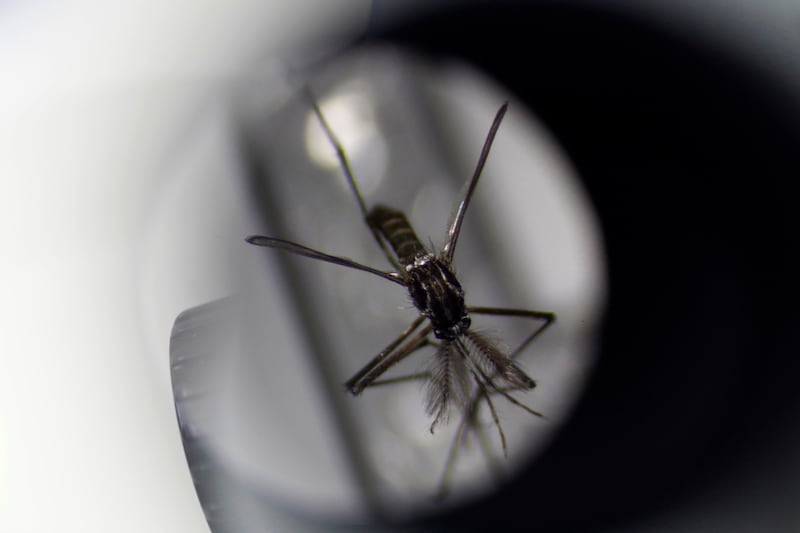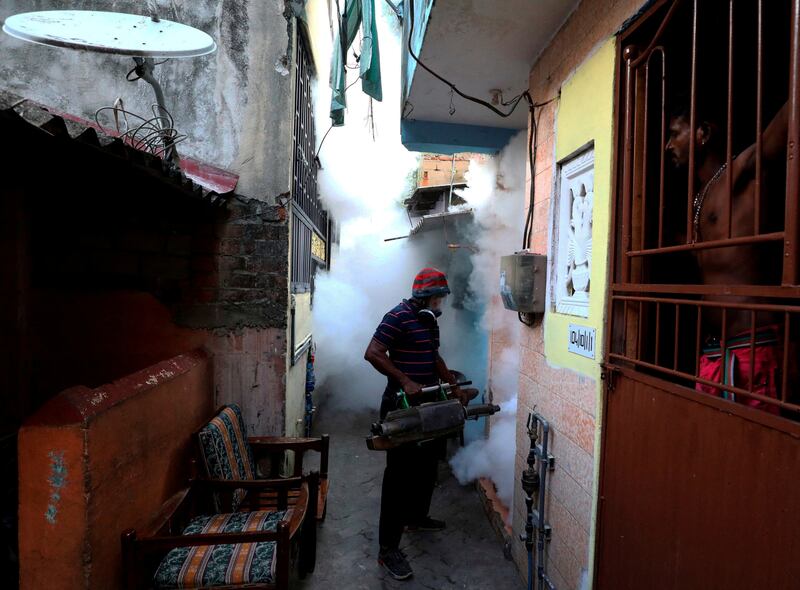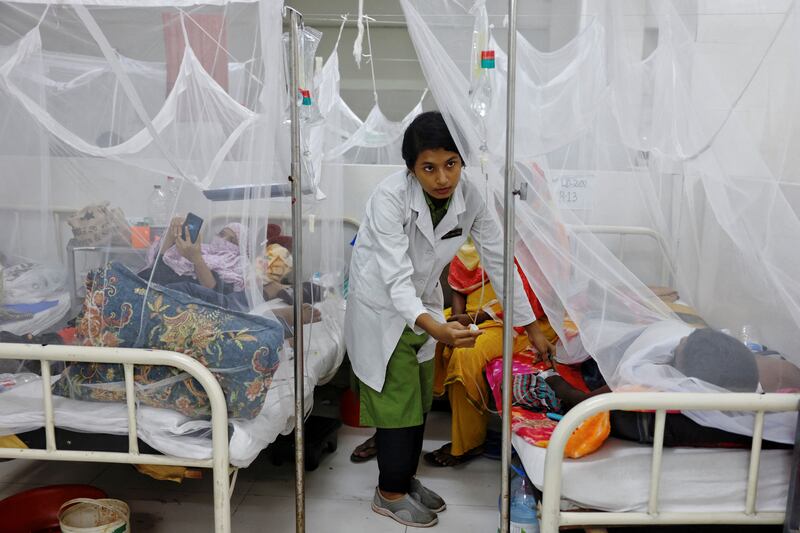When Shahinur Begum traveled hours north to Dhaka with her son last month, it was supposed to be a chance to visit her husband sick with cancer. But within days of arriving in Bangladesh’s teeming capital, she had a new health emergency on her hands.
Her 14-year-old son, Sabbir, was admitted to hospital vomiting blood, with a spiked temperature of 103 degrees Fahrenheit, and barely enough energy to stand.
“The doctor confirmed him as a dengue patient,” said Halima Begum, Sabbir’s aunt who spoke with BenarNews from the teenager’s bedside at Suhrawardy Hospital in Dhaka.
“Can you imagine the condition of a woman when her husband is fighting for life at one hospital, while her son is struggling at another?”
Bangladesh is reeling from what authorities are calling an unprecedented outbreak in the mosquito-borne illness. So far during this calendar year, nearly 70,000 people have been diagnosed with dengue.
The confirmed death toll since Jan. 1 has now risen to 327 - a record for a single year in Bangladesh – according to the latest data from health authorities. Within the past 24 hours, about 2,800 patients were admitted to Bangladeshi hospitals, many of which have run out of beds to accommodate new arrivals.
The situation could spin out of control because of a shortage of doctors, hospital beds and logistics, said Nazrul Islam, a professor of virology at the Bangabandhu Sheikh Mujib Medical University Hospital in Dhaka.
“You see patients with fevers in almost every household in Dhaka,” he told BenarNews.

Nations across South and Southeast Asia are grappling with a surge in dengue cases, amid signs that global warming could drive a record number of infections worldwide in 2023, the World Health Organization (WHO) reported last month.
In the year to July 20, Malaysia for example recorded 56,721 cases of dengue compared to 23,183 cases in the same period last year, an increase of 144.7%, the WHO said. Deaths have more than doubled in the first half of the year compared with 2022, reaching 39.
As of July 19, Thailand’s Department of Disease Control registered 46,855 cases, including 41 fatalities, up from 16,542 for all of last year and the highest rate since 2020.
Infections have also spiked in Cambodia, the Philippines and Sri Lanka.
“What is driving this more synchronous increase in cases compared to previous years is uncertain at this time,” said Ooi Eng Eong, professor of Emerging Infectious Diseases at Duke-NUS Medical School in Singapore.
"It is probably the virus [mutating], but it could be a whole lot of other factors including weather patterns and climate change, as well as perhaps the El Niño weather phenomenon this year."

Dengue, which is transmitted by the bite of the Aedes aegypti mosquito, is the world’s fastest spreading tropical disease, according to the WHO.
Long-term factors driving transmission include urbanization and greater global mobility, which create more breeding habitats for mosquitoes and expand their geographical range. Climate change has also been blamed for intensifying outbreaks.
Elevated global temperatures set the stage for enhanced dengue virus replication in mosquitoes, increased reproductive capacity and biting rates, as well as extended transmission seasons, several studies show.
Scientists are reluctant to identify El Niño as the cause of this year’s surge, but warmer temperatures caused by the weather phenomenon in Asia can have similar short-term effects on transmission.
Hospitals swamped
In Dhaka, the epicenter of Bangladesh’s current outbreak, the city’s creaky public health system is being placed under enormous strain.
The government has put aside two hospitals to accommodate the rising number of infections and called on all medical colleges and public hospitals across the nation to open dedicated dengue wards.
“We have been struggling to treat the patients,” said Dr. Syeda Fahmima Momo, who was the on-duty doctor at Shaheed Suhrawardi Hospital in Dhaka on a recent Thursday night.
“I am the lone doctor in charge of several wards, including the dengue wards located at different floors of the multi-storeyed building. This is really tough to manage.”

There is no specific treatment for the four serotypes of dengue. While most cases are mild or asymptomatic, some people can experience a high fever, headache, body aches, nausea and minor hemorrhaging. Recovery is typically focused on managing pain and keeping patients hydrated.
So far, only two vaccines have been licensed in a select number of countries — one of which requires evidence of past infection.
The World Mosquito Program’s method of infecting local mosquito populations with wolbachia, a naturally occuring bacteria that stops the virus replicating, has also shown positive results in reducing transmission.
But in most of developing Asia, managing the disease is done primarily through insecticide treatment to suppress mosquito populations, by mobilizing communities to eliminate breeding spots like water containers around houses, and strengthening the health system to deal with outbreaks.
“The tools we have available at the moment are clearly not addressing this emerging urban problem of dengue. We have seen escalating cases since the 1950’s,” said Peter Ryan, the director of Field Entomology at the World Mosquito Program and director of the CEO Office.
“We’ve seen great inroads around reductions of global malaria cases over the past two to three decades, but if anything the dengue trend is the reverse of that.”

The incidence of dengue is increasing not just in tropical and subtropical areas, but also in more temperate zones, such as Europe. One modeling estimate cited by the WHO indicates 390 million dengue virus infections per year of which 96 million manifest clinically — and the situation is forecast to get worse.
Asia bears 70% of the global dengue burden and its sprawling, rapidly growing megacities like Dhaka or Jakarta are ideal breeding grounds for Aedes aegypti mosquitoes.
In the most endemic countries, children, adolescents and women who usually take the role of primary caregivers, are most at risk, Ryan said. And the poorest communities are typically the most affected, because of the out-of-pocket treatment costs.
Ooi, from the Duke-NUS Medical School, said the reality was that dengue was here to stay.
“Even if the incidences of dengue peaks this year, we can be sure that in 3-4 years time or 5-7 years time, depending on where you are, there will be another peak and that will likely be larger than this one,” he said.
“So we have to make plans to stay ahead of the game. There are tools like vaccines, wolbachia … and the more we introduce these things into public health, the more ready we are to live with dengue.”
Kamran Reza Chowdhury contributed to this report from Dhaka.
